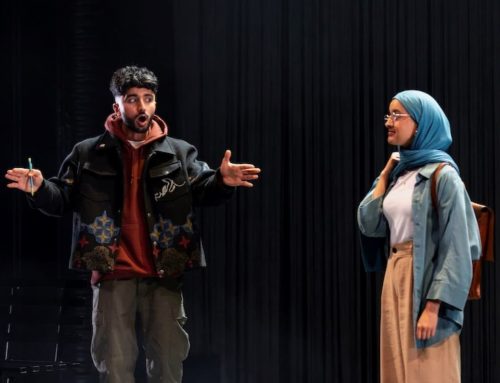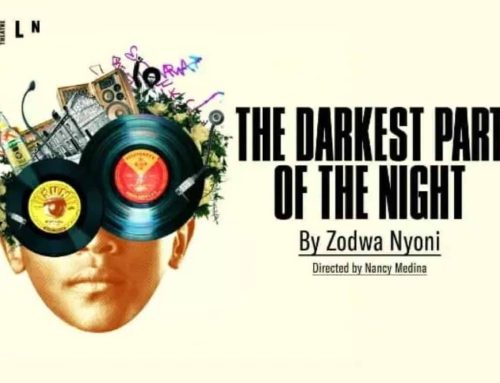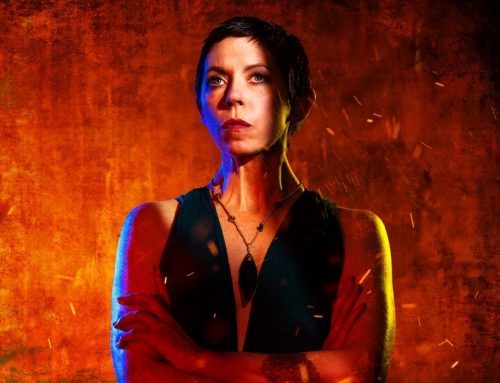Iman Qureshi’s feel-good, ensemble celebration of found family, The Ministry of Lesbian Affairs, makes a welcome return, three years after its first outing at the Soho Theatre. Set in a ramshackle lesbian choir in Soho, the piece draws directly on the ‘comedy of resistance’ strain in British film and theatre: plucky ordinary amateurs banding together to challenge injustice, subvert expectations, and find a common cause. Think The Full Monty populated by culturally diverse queer and non-binary women. The first half is brimming with exuberant belly laughs, delivered by an outstanding cast. The second, more sombre half wrestles with integrating political themes into a coherent narrative flow.
Frump, middle-class, “older, wiser, lesbian” Connie (a glorious Shuna Snow) leads the band with world-weary resolve and pithy verbiage sharp enough to cut through any dissent. “Listen to each other, you’re not listening to each other!” she yells constantly at the rag-tag members. One suspects that this is writer Qureshi and director Hannah Hauer-King’s theme in the piece, a message intended for both queer women and the broader LGBTQ community.
Members include broadband engineer Lori (Leah Harvey), who has been in a relationship with woke, bisexual academic Ana (Georgie Henley) for 7 years, but is still not out to her church-going family. Then there is permanently horny, Ellie (Fanta Barrie) who identifies as non-binary: “mostly they, sometimes she, rarely he, I’m not fussy” she tells us as she eyes up the new arrivals with barely concealed lust. “Try not to sleep with any more new members”, Connie implores Ellie, “they’re all too sacred to come back”.
Wealthy, Muslim, mother of two, Dina (Serena Manteghi) finds in the choir a place of refuge from a brutal husband and an unaccepting culture. The plot machination whereby Dina joins the choir forms one of many priceless first-half comic moments, while straining the far reaches of credibility, even for a comedy. Trans, corporate lawyer Bridget (Mariah Louca) and caustic, wheelchair-bound, feminist Fi (Liz Carr), who may or may not have the hots for each other, form the final members of the septet.
Designer Anna Reid has immense fun with the costume palette that takes a comprehensive trawl through every lesbian fashion stereotype: anticipate ill-fitting jeans, beanie hats, baggy jumpers, and sale items from The North Face. Reid’s set neatly conveys a leafy rural church hall from a generation ago, complete with an upright piano, rafters, and a leaky roof —a familiar, conservative environment cleverly subverted into a radical safe space for diverse urban queers. One presumes the leaks, which worsen increasingly as the play progresses, are a metaphor for unwanted intrusions from the outside world into the women’s shared sense of community. Leaks, of course, tend to develop into damaging floods. Aside from rain, intrusions come in the form of a violent drive-by encounter with a misogynistic drunk in a local pub (Zak Ghazi-Torbati plays all the stock male characters), and more upliftingly, an invitation to sing on the Pride main stage. The show blurb describes The Ministry of Lesbian Affairs as a musical comedy, which is only partially true, given that the tunes (from Tracy Chapman, Petula Clark, Simon and Garfunkel, among others), though beautifully sung (this choir would be a knockout at a real-life Pride), add nothing to the narrative.
Qureshi gives us a witty verse prologue before each half, delivered by the ensemble in the style of a Greek chorus. Greek tragedy warns us that those who act with hubris will be humbled. Hubris here is the group’s belief that they can hide themselves away from wider (sometimes bitter) schism in the LGBTQ community about trans rights. Their humbling comes in the form of a car crash performance at Pride that goes viral on Instagram and sees the group banned from future Prides in perpetuity. Any choir needs harmony. Disharmony once aired is difficult to mend. Which of these women’s relationships will survive?
The second half of The Ministry of Lesbian Affairs airs issues of transphobia, racism, and ableism in extended dialogue that is impeccably even-handed. The debate is worth airing, but it has the effect of darkening the comic tone of the piece and interrupting the storytelling. Although an ensemble work, the emotional crux comes in the visibly decaying relationship between Lori, who is conflicted between family and relationship and the cat-loving “Wokey kokey, killjoy” Ana. Dina’s family subplot remains woefully unexplored.
Shuna Snow’s Connie skips her way across the stage, energetically flicking her fingers to the rhythm like a demented Penelope Keith. Carr’s Fi embodies righteous anger at the group’s seeming failure to understand the needs of disabled people. Louca’s stoic Bridget oozes hard-fought, determined self-respect.
Writer: Iman Qureshi
Director: Hannah Hauer-King
New – Online Shop!
My collected theatre reviews now available in paperback format for the years 2022 and 2023.
Just £10 per copy.
Over 100 reviews in each book.
- John Cutler’s Collected Theatre Reviews – Volume One. 2022. Paperback. 296 pages. ISBN 9781805179757. £10
-
John Cutler’s Collected Theatre Reviews – Volume Two. 2023. Paperback. 284 pages. ISBN 9781836884170. £10
Visit my Online Shop or click on Buy Now to order your copies.
More Recent Reviews
The Sea Horse. Golden Goose Theatre.
The Sea Horse, Edward J Moore’s grim slice of mid-century realism, debuted to solid reviews off-Broadway in 1974. Since [...]
Garry Starr: Classic Penguins. Arts Theatre.
Emperor penguins’ shortish treks between sea and nesting sites are about as peripatetic as your average Thameslink commuter. Garry [...]
When the Clarion Came to Call. Cockpit Theatre.
When, upon entering an auditorium, you are told, ‘Take as many pictures as you like, but mind the ceramics,’ [...]







